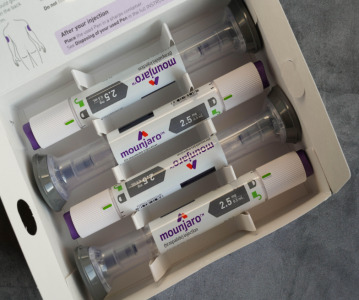FDA Approves Epanova for the Treatment of Adults with Severe Hypertriglyceridaemia

AstraZeneca has announced that FDA has approved Epanova (omega-3-carboxylic acids) as an adjunct to diet to reduce triglyceride levels in adults with severe hypertriglyceridaemia (triglyceride levels greater than or equal to 500 mg/dL).
Epanova is the first FDA approved prescription omega-3 in free fatty acid form. The dosage of Epanova is 2 g (2 capsules) or 4 g (4 capsules), making it the first prescription omega-3 to have a dosing option as few as two capsules once a day, with or without food.
“The FDA’s approval of Epanova is good news for the significant and growing population with severe hypertriglyceridaemia as it offers physicians and their patients an important new treatment option that has been proven to be effective in clinical trials,” said Briggs Morrison, Executive Vice President, Global Medicines Development and Chief Medical Officer at AstraZeneca. “This approval is a significant milestone for AstraZeneca, as it strengthens our existing portfolio of cardiovascular medicines. We are committed to further assessing the clinical profile of Epanova and to identifying other patient groups it may benefit.”
Triglycerides are a type of lipid (fat) found in blood and an essential energy source for the body. Some people have very high triglyceride levels (severe hypertriglyceridaemia), meaning they have too much fat in their blood which can lead to serious health complications. Nearly four million American adults currently have severe hypertriglyceridaemia and this figure continues to rise, as the prevalence of associated conditions, such as obesity and diabetes, continues to grow. Epanova is a pure, free fatty acid form that can provide physicians with an option to effectively manage the condition without dramatically increasing a patient’s pill burden.
The FDA approval was based on data from a clinical development programme that included positive results from the Phase III EVOLVE (EpanoVa fOr Lowering Very High triglyceridEs) trial, which examined the efficacy of Epanova in lowering triglycerides and other key lipid parameters in patients with very high triglycerides. The effect of Epanova on the risk of pancreatitis or on cardiovascular mortality and morbidity has not been determined.
As part of AstraZeneca’s commitment to addressing unmet need in cardiovascular disease, the company is continuing to evaluate the clinical profile of Epanova. Through a large-scale cardiovascular outcomes trial, STRENGTH (STatin Residual risk reduction with EpaNova in hiGh cardiovascular risk paTients with Hypertriglyceridaemia), AstraZeneca plans to evaluate the safety and efficacy of Epanova on cardiovascular outcomes in combination with statin therapy, in patients with mixed dyslipidaemia who are at increased risk of cardiovascular disease. AstraZeneca also plans to pursue the development of a fixed dose combination of Epanova with a statin and plans to file for regulatory approval in other markets for the severe hypertriglyceridaemia indication.
Related News
-
News The next 15 drugs up for negotiation with Medicare include several blockbusters
By now, everyone is quite familiar with the drug price negotiations taking place between drug companies and the Centres for Medicare & Medicaid Services (CMS) in the USA as part of measures being taken to reduce the cost of drugs for patients, to make ... -
News PSCI Welcomes Delpharm, Samsung Biologics, and Suven as First Supplier Partners
The pharmaceutical industry continues to evolve with an increasing focus on responsible sourcing, sustainability, and collaboration across the supply chain. Under a new model to recognise suppliers within the pharmaceutical and healthcare industry that... -
News Drug prices agreed upon as part of the US Inflation Reduction Act
The Inflation Reduction Act brought into constitution by the Biden administation in 2022, which proposed a drug price negotiation between the government and pharmaceutical companies, has reached it's first agreement. -
News Eisai Alzheimer’s drug authorised in UK but still faces obstacles
In partnership with BioArctic AB, pharmaceutical company Eisai has been granted Marketing Authorisation by the Medicines and Healthcare products Regulatory Agency (MHRA) for its Alzheimer’s disease drug product Leqembi. -
News Eli Lilly's weight loss drugs removed from the FDA's shortage list
The US FDA have recently updated their drug shortage list. The recently released list shows that all dosage forms of Eli Lilly's weight-loss drug Zepbound and their diabetes drug Mounjaro are now available. -
News Global advancements in the diagnosis and treatment of rare diseases: Rare Disease Day 2024
Rare Diseases Day is celebrated on the 29th February 2024 and represents the plight of rare disease patients to gain diagnosis and access to suitable treatment. -
News Pharmaceutical industry supports COP28 health stance in joint statement
As COP28 takes place over this week in Dubai, UAE, several bodies in the pharmaceutical and health industries have come together to announce support of key movements in sustainability in the sector, and to recognise sustainability as a health issue.&nb... -
News Biden backs Cold-War measures to shore-up medical supply chains
In a recent strategy to combat rising inflation and the cost of living crisis, President Joe Biden has invoked a Cold War-era act to increase investment in a selection of medicines and supplies.
Recently Visited
Position your company at the heart of the global Pharma industry with a CPHI Online membership
-
Your products and solutions visible to thousands of visitors within the largest Pharma marketplace
-
Generate high-quality, engaged leads for your business, all year round
-
Promote your business as the industry’s thought-leader by hosting your reports, brochures and videos within your profile
-
Your company’s profile boosted at all participating CPHI events
-
An easy-to-use platform with a detailed dashboard showing your leads and performance



.png)



